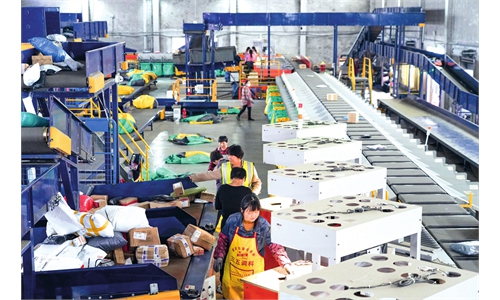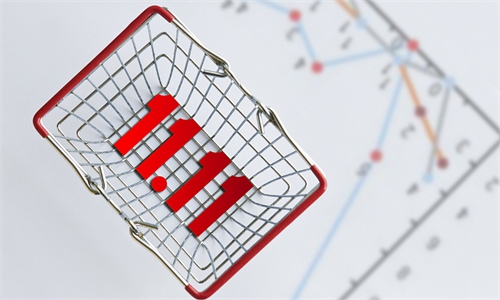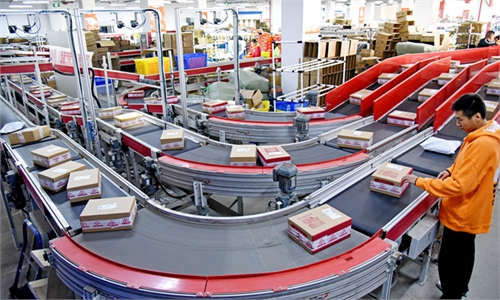China’s Double 11 loses glamour, focuses on high-quality growth amid tight regulations
Platforms focus on high-quality growth amid tight regulations

Workers deliver packages to the Xi'an North Train Station in Northwest China's Shaanxi Province on Wednesday. With this year's Singles' Day shopping spree sales exploding after the COVID-19 was effectively put under control in China, railway shipments for Double 11 kicked off on November 1, and the number of packages delivered daily is forecast to increase about 30 percent. Photo: cnsphoto
Without glamorous galas or eye-popping promotions, the most momentous point this year of China's Double 11 shopping festival - the world's largest shopping carnival - arrived in a low-profile and conservative manner on Wednesday night, amid Chinese regulators' stepped-up supervision of internet platforms.
Alibaba, one of the first Chinese e-commerce platforms that started the shopping festival a decade ago, held a very low-profile evening party without a live studio audience to celebrate the event - a sharp contrast to previous years when global celebrities, including Taylor Swift, were invited to perform at live events.
The e-commerce giant, which was fined by Chinese regulators a record $2.75 billion for anti-monopoly violations in April, appears to seek a low profile.
Several insiders confirmed to the Global Times that Alibaba wouldn't invite media and industry insiders to a press conference at its headquarters in Hangzhou, East China's Zhejiang Province this year. Alibaba said that it will not have a live studio audience due to new COVID-19 outbreaks, and this year's event will be broadcast live.
0
"The priority of this year's shopping bonanza is to pursue high-quality growth and how they improve consumers' sense of gain and shopping experience. This is a departure from the previous flamboyant approach and a genuine return to the substance of business," Liu Dingding, a Beijing-based independent tech analyst, told the Global Times on Wednesday.
In a statement sent to the Global Times on Wednesday, online-to-offline retail platform Dada, owned by JD.com, said it had launched a Nearby service in recent days, and users - through a tab on the homepage of JD's app - can get goods delivered within hours.
Alibaba said that China is luxury's growth engine, as this year's 11.11 shows. Between November 1 and 3, the number of luxury buyers in China grew more than 40 percent year-on-year.
The number of luxury buyers from lower-tier cities increased by close to 50 percent year-on-year, according to recent sales data. Consumers from nearly 400 cities in China placed orders on Tmall Luxury during this 11.11, defying the belief that luxury is limited to urbanites.
Analysts said that sales during this year's Double 11 festival will climb to a certain extent, amid China's steady economic recovery from the pandemic and the expanding consumption power of Chinese residents.
But major platforms are highly unlikely to disclose their gross merchandise value (GMV) like they did in previous years, over a variety of concerns.
A Beijing-based salesperson surnamed Yang told the Global Times on Wednesday that she bought some popular consumer goods like food, pet items and off-season clothes during this year's Double 11. She spent 2,600 yuan, which was nearly half what she spent last year.
In addition to the fact that her income was not as good as last year, other platforms such as Pinduoduo also provide cheap products all year round, so there is little need to stockpile.
Chinese experts said that the situation in the manufacturing industry is different from last year, when materials at the upstream were in full supply and there were no power curbs, which left sellers with plenty of goods in stock this year.
"The sellers have a good intention to cut stockpiles, which makes the goods cheaper," Hu Qimu, chief research fellow at the Sinosteel Economic Research Institute, told the Global Times on Wednesday.
Hu added that the platforms don't want to see big price cuts, for it may involve them in monopoly or dumping claims, which may be the "red line" for the players.
Still, the event, which Alibaba said features more than 900 million consumers and 290,000 brands, is a new battlefield for livestreaming, and there are more than 700 key opinion leaders and brand representatives hosting livestreaming sessions during this year's 11.11.
The Global Times earlier reported that the cumulative livestreaming sales of Chinese livestreaming star Li Jiaqi reached 11.5 billion yuan, with estimated sales of 37.71 million yuan on October 20, the first day of this year's Double 11 shopping festival, according to data released by China's e-commerce platform Taobao.
Livestreaming could be a driving force for e-commerce, and it will be a trend also, Liu said.



